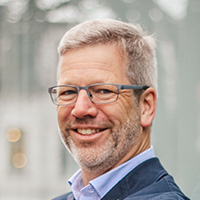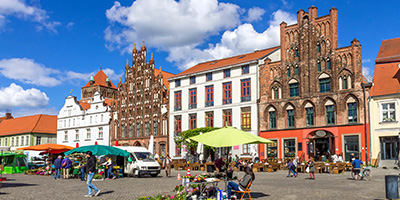My path to becoming mayor I have often been asked how I came up with the idea to run for Mayor of Greifswald in 2015. At that time, I had been working as a trained archaeologist for 15 years, serving as a historian at the Pomeranian State Museum in Greifswald. I don't come from an administrative background, nor have I studied law, politics, or a related field. Taking responsibility and actively contributing has been a part of my life since childhood. I've been a class and student representative, co-founded a student newspaper, and established a student representation during my studies. As a young father, I opposed a school closure and entered local politics through the founding of the Greifswald Family Alliance. It has always been important to me not just to criticize but to take action. I recognized early on the importance of engaging in political processes to have a direct impact on local affairs. I deeply believe that active participation in shaping society is the key to a more livable future. The decision to run for election after six years of voluntary work in the city council, to take on the full-time responsibility of Lord Mayor for my city, was a logical consequence. Being a mayor is not just a political decision but also a profound commitment to the community one represents. It provides an opportunity to actively bring about positive changes. My guiding principle is to shape the growth of Greifswald sustainably—for the city and its residents, as well as for future generations and the environment. Transparency, citizen participation, and social justice are indispensable elements on this journey. A focused approach to children, youth, the financially vulnerable, and physically challenged individuals strengthens every community. Investments in social harmony enhance the quality of life for all residents of a city. These convictions guide my actions as mayor. Now, what role can international relations play in the positive development of a city? What can a city of 60,000 residents achieve? International relations have a long tradition Without international connections, a forward-thinking and acting city would likely not exist in today's world. An extensive network generates and ensures the exchange of many ideas, thoughts, and experiences. I am firmly convinced that through international connections, a community is significantly inspired towards many good and new ideas. At the same time, international exchange fosters and shapes the conviction of the importance of democratic and peaceful coexistence. The expansion and revitalization of our city's international relations were one of the goals I pursued when I took office as Mayor of the University and Hanseatic City of Greifswald in 2015. As the name suggests, we are an old Hanseatic city accustomed to engaging in trade with other cities. A friendly and peaceful coexistence on an equal footing was crucial for the prosperity and security of the citizens even during the time of the Hanseatic League 700 years ago. The exchange of trade, investments, and innovations continues to contribute to economic development and job creation. Teaching and research Since 1456, Greifswald has had a university that radiates its influence worldwide. Through numerous projects and institutes across our five faculties and non-university national research institutions, Greifswald is globally present, particularly in the fields of plasma physics, animal and human health, language and cultural studies, and health and bioeconomy. Greifswald is the German center for Ukrainian studies and does not forget small cultures with offerings in Baltic and Finnish languages, for example. It is the world's leading center for peatland research, with a strong impact, especially in East Africa, Central Asia, and Indonesia. The new Helmholtz Institute for One Health exemplifies how our well-being globally depends on intensively addressing the interconnections between humans, animals, and the environment. Greifswald is also home to nearly 10,000 students from European and non-European countries annually, along with international researchers and fellows at the Krupp College. Learning through dialogue Through city-to-city relationships, peace can be promoted. Cultural exchange and dialogue help break down misunderstandings and promote peaceful coexistence. In difficult times, municipalities can often still engage in dialogue when others resort to violence. Greifswald embraces this opportunity and responsibility of cities. Greifswald is active in four international organizations and networks: since 1993 in the Hanseatic League of the Modern Era, since 1999 in the Union of the Baltic Cities, since 2016 in the "Cities for Life – Cities against the Death Penalty" network, and since 2020 in the global organization "Mayors for Peace" (abolition of nuclear weapons). Greifswald takes pride in its 11 sister city relationships: Kotka in Finland (1959), Osnabrück in Germany (1988), Lund in Sweden (1990), Hamar in Norway (1992), Goleniów and Szczecin in Poland (1986 and 2010, respectively), Pomerode in Brazil (2001), Tartu in Estonia (2006), Newport News in the USA (2007), East Samos in Greece (2015), and Drohobych in Ukraine (2017). The partnership with Vyborg in Russia, established in 2018, is currently on hold. The three most recent partnerships were initiated or revitalized under my guidance. These sister city connections exhibit a diverse complexity that strongly manifests in our city's society. Approximately 150 institutions, including schools, sports clubs, cultural associations, kindergartens, municipal facilities, partnership associations, and non-governmental organizations, regularly maintain and nurture contacts, projects, exchange programs, and meetings. Whether it's joint musical performances during the Nordic Sound Festival, youth encounters with the partner municipality East Samos, language projects involving daycares from Greifswald and Polish Goleniów, professional exchanges between fire departments, establishment of networks for early childhood education, climate protection projects with Brazilian Pomerode and Newport News in the USA, or collaborative volleyball games with athletes from Swedish Lund, these are just a few examples. Cities play a crucial role in environmental and climate protection. Often, cities are the main contributors to environmental issues or CO2 emissions, but they are also places where innovative solutions for climate change can be developed and implemented. Through the exchange of eco-friendly practices, cities can collectively contribute to mitigating climate change, promoting environmentally friendly measures, and addressing global environmental issues. Friendships start with first encounters All of this creates encounters among people, encounters for people, and helps break down prejudices, challenge stereotypes, adopt new perspectives from one culture to another, build bridges, foster friendships, and provide the opportunity to approach each other on an equal footing. Every individual who experiences these international encounters is shaped by them and contributes to a globally open and democratically minded Greifswald. This promotes understanding, tolerance, and appreciation for different lifestyles and perspectives, with a particular focus on young people. Confronting one's own actions and ideas with different perspectives can be very healing and helpful. The outside perspective on our city sometimes reveals surprising insights, and the professional gain is invaluable. All of this is a matter of great importance to me. I thank all the citizens who volunteer each year for this international work, enriching Greifswald. As the Lord Mayor, I can initiate many things, establish contacts, open doors, engage in conversations, encourage, provide financial support, and show appreciation. However, it is the citizens who breathe life into international collaborations, contributing to actively lived partnerships. Europe and beyond For obvious reasons, there is a special emphasis on the theme of "Europe." In addition to the intensive collaboration with our European partner cities through EU funding programs, I have initiated specific educational and exchange programs for Europe in Greifswald. These include exchange programs for trainees in the city administration and the educational program 'Europiene' for 7–12-year-olds. As a new goal, I have set the establishment of a development partnership with a city in the Global South. Greifswald is ready to take on more global responsibility. Therefore, I am in discussions with Greifswald stakeholders already engaged in Africa to initiate a partnership with a municipality in Africa by 2024. Themes such as sustainable development, equality, citizen participation, democracy, and environmental protection are heartfelt concerns that guide my actions. A city does not exist in isolation. We also have a responsibility beyond city borders. To strengthen democracy and the rule of law, as well as to uphold human rights, I contribute my role and capabilities as Mayor to European bodies. I am a member of the Council of European Municipalities and Regions within the Council of Europe and the Council of European Municipalities and Regions within the European Union. As Mayor, I often ask myself, where and how can I set the course for a better future. I am glad to hold a position where I can significantly influence this. At the same time, I stay in constant dialogue with the citizens on every issue, aiming to be sensitive to the needs of the people and to incorporate them equitably into political and democratic decision-making processes. I am easily and directly reachable through various channels, including social media. I cover 3,500 km by bicycle in Greifswald on my official routes every year. This is not only beneficial for the environment, climate, and my personal well-being but also facilitates direct contact on an equal footing. Essays by: Mayor of Dover | Mayor of Graz | Bürgermeisterin von Graz | Mayor of Greifswald |Oberbürgermeister von Greifswald | Mayor of Oliveri | Sindaco di Oliveri | Mayor of Quelimane | Mayor of Utrecht | Burgemeester van Utrecht | For your information: The World Mayor Project, organised by the philanthropic City Mayors Foundation since 2004, has no connection with any city or organisation and is run on strictly non-commercial lines. Sponsorships, advertising, subscriptions, donations or any other kind of revenue are NOT sought and will be rejected, if offered. Privacy: All personal information you provide us with will be treated in strict confidence. Your email addresses will NOT be passed on to any third parties. Also, we do NOT collect data by cookies or other hidden means. Please contact us if you have any further questions. Please insert 'World Mayor 2023' in the subject line of any email. © Copyright: All content of the City Mayors and World Mayor websites is protected by worldwide copyright. Please contact us if you wish to use any material from the City Mayors, World Mayor or Women Mayors websites. |
||||||||||||||||||||||||
|




